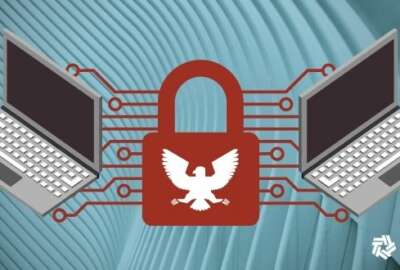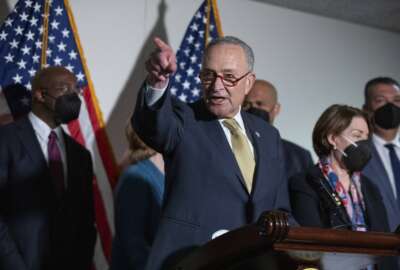Justice Breyer might have just caused the continuing resolution to stretch out
Everyone is in a tizzy over the Supreme Court vacancy but the outcome is fairly predictable. More uncertain is what they'll do about the federal budget.
Best listening experience is on Chrome, Firefox or Safari. Subscribe to Federal Drive’s daily audio interviews on Apple Podcasts or PodcastOne.
Congress returns to town this week. And of course, everyone is in a tizzy over the Supreme Court vacancy. But the outcome there is fairly predictable, actually, more uncertain is what they’ll do about the federal budget and a few of what should be bread and butter issues. The Federal Drive with Tom Temin got more from WTOP Capitol Hill correspondent Mitchell Miller.
Interview transcript:
Tom Temin: And that’s my take Mitchell, that this is predictable. There’ll be a song and dance, but the Biden nominee for the Supreme Court will be confirmed in the end, fair to say?
Mitchell Miller: I think that’s fair to say, but it will chew up a lot of additional time for the U.S. Senate. And of course, even though we’re early in the year, believe it or not, as you know, congressional deadlines are always seeming to be around the corner. And this is another one where Congress is just pushing it. A lot of work to take place starting this week coming off of the break with the House and Senate both out last week. And if Congress is going to somehow avoid another continuing resolution, they’re really going to have to get busy this week. Staff work, of course, continued last week, but there’s going to have to be a big push now from the top appropriators on the House and Senate, including Sens. Patrick Leahy (Vt.) and Richard Shelby (Ala.). Shelby has not been quite as bullish as Patrick Leahy has been about reaching some kind of overall deal. The house as usual ahead of the Senate has so far passed nine out of the 12 appropriations bills for funding the government for fiscal 2022. But the Senate has not brought any appropriation bills to the floor, and lawmakers are still trying to figure out that top line spending figure. There is some optimism if once they could get to that figure, a lot of other things could come into place. But there’s really a general agreement here that leaders don’t want a year-long continuing resolution. The military branches have been raising concerns about another CR and how it would hurt their long term planning. And in fact, a top Navy official last week just noted that the Navy could face a half-billion dollar shortfall for its ballistic missile submarine program, among other things, if this is going to continue into a longer CR. So a lot of moving parts as usual here.
Tom Temin: Yes, and then there’s the Russian situation, which has some military on high alert in some parts of our military. Over there, there’s some troops on high alert. And if the Russians are going to do anything, they’re going to do it soon. Because if they wait till spring, their tanks will get stuck in the mud.
Mitchell Miller: Exactly. And then you also have the Olympics getting underway soon in China. And of course, Russia and China have their own relationship there. So it’s really going to be interesting to see what the military is going to have to do in connection with all those developments overseas.
Tom Temin: So therefore, Congress is going to have to do a couple triple axel backflips, that somebody over there can get into shape. Alright, so there’s the budget issue. And again, as you say, there are a lot of cycles of mind taken up with the Supreme Court. And what about nominations otherwise? Because there’s still a slew of them sitting before the Senate.
Mitchell Miller: There are and the Senate has really moved through a lot of the judicial lower level nominations through so they’ve gotten dozens of those through. But they’re stacking up and they do have to get those through. And to get back to your issue in connection with the Supreme Court nominee, as you know that there’s only so much time in the Senate calendar because you have all these breaks throughout the year. And nominations is one that dominates the time now in the Senate floor. And so they have to get those through. And then they have to schedule, of course, the hearings and have meetings with lawmakers in connection with whoever the nominee is once the president names the nominee. And then you have all the other regular machinations going on with just the normal budgetary situation. So all of those nominations are going to be piling up as well. So the Senate’s really going to have to get on the stick here.
Tom Temin: And it’s fair to say, too in regard to that, that the Supreme Court nomination, every committee is going to want to hear from the Supreme Court nominee, because whatever the Supreme Court touches will have something to do with that committee. It’s unlike, say, getting a general approved. And the judiciary committee’s not going to give a darn about that one.
Mitchell Miller: Right. Exactly. So all these lawmakers are going to want a piece of this. We have all these pending issues before the High Court. And even though this is in historic terms, the retirement of Stephen Breyer is relatively long range. I mean, usually, as we’ve noted, in the last few years, things happen rather suddenly, obviously with Ruth Bader Ginsburg, she died and things change very, very quickly. Senate Majority Leader Chuck Schumer (N.Y.) has indicated he wants to get the nominee, whoever it may be on a fast track. Once that happens, as you may remember, of course, Amy Coney Barrett, the latest justice to join the High Court, she was basically confirmed in just over a month. That was one of the quickest ever so the Senate wants to move this, at least Senate Democrats want to move this through fairly quickly. But there are things that the Republicans of course can do to slow the gears and not move this through so quickly. I think we’ll see some of that and then that will all play in with these other issues with the nominations at different levels as well as the budgetary situation.
Tom Temin: We’re speaking with WTOP Capital Hill correspondent Mitchell Miller. And droning on and on in the background of all this is uncertainty over the federal vaccine mandate. And it’s been struck down at the lower court level and funny, it could be the Supreme Court has to hear that one also. And what is likely to happen if anything on the Hill with respect to that issue that won’t die?
Mitchell Miller: Well, it’s interesting, because that issue actually could come into play in connection with the continuing resolution and efforts to get the budget moved forward. There has been some noise from some House Republicans and other conservatives who say that if the funding for federal vaccine mandates isn’t included in the latest spending plan, that they will try to hold it up. Now whether they would actually go toe to toe with Democrats and say, we’re going to have a shutdown over this remains to be seen. But certainly that is always a possibility. We always know that as we get closer in the coming weeks, that shutdown will at least be mentioned as people try to get some political leverage on various issues. But in terms of the agencies themselves, and in terms of the military, it seems like everything is effectively on pause right now, in terms of the mandate, because of that ruling from the judge in Texas, that they are holding off on moving toward any kind of discipline for a lot of people. As this gets resolved. Now, the White House has said that it’s confident it is going to basically have a supportive ruling, ultimately on this issue, that still is unclear. But at any rate, the judge also who made that ruling, it’s interesting, noted that the vast majority of people that were affected by this federal mandate actually have been vaccinated. So the judge actually pointed out that it’s not going to have quite as much of an impact as many people might think. But nonetheless, it’s still a huge issue as to whether or not this goes forward.
Tom Temin: Well, in Washington, people like to argue even over moot issues. So why not this one also?
Mitchell Miller: Exactly.
Tom Temin: And then behind all of that is the pieces or chunks, I think as the president and some of the Democrats have called them, of the Build Back Better plan, which did not pass last year. And will that eat up cycles on the Hill to try to get maybe pieces of it done?
Mitchell Miller: Well, it’s interesting. Yeah. House Speaker Nancy Pelosi recently said chunks. That’s an interesting term that the president used. But at any rate, that was the one that President Biden used a few weeks ago, and they are trying to figure out are these parts of the Build Back Better plan somehow going to move forward? And really, right now, there is not a specific plan to move forward. Now, House Majority Leader Steny Hoyer was optimistic last week in an interview with Politico saying that he thinks it can be brought back. But right now, there is no game plan, if you will, for how that would happen. And there’s different opinions about how it could happen. It’s interesting, I was talking with Virginia Sen. Mark Warner (D), who’s been deeply involved with these budget talks over many, many months. And he is one of those who is skeptical of breaking it apart into those chunks too much. Because basically, he points out and House Speaker Pelosi pointed this out as well, that if you do that, then you lose the fact that you can get it through reconciliation on only 50 votes. And Democrats, they have enough trouble getting their own 50 votes, much less getting any Republican votes. So once you split this up and try to say, well, we’re going to extend the Child Tax Credit, which incidentally, West Virginia Sen. Joe Manchin remains opposed to bringing it into part of the Build Back Better plan. If you try to break all of this up, then you have to start working on getting at least 10 Republicans to avoid a filibuster. So given that, along with the fact that you do have the Supreme Court nominee now getting into the lifeblood of Congress here, it’s just really hard to see where Democrats are going to go with this. They’re going to continue to talk about it and say that they want to move it forward. And it’s going to be a talking point for sure. But I think it’s going to be very difficult for them to get the nitty gritty of this done, at least in the coming weeks and months. Now, one last point related to that is when I did talk to Sen. Warner, he kind of hinted that there might be something in the works, maybe a smaller package that might be coming sometime in the next few weeks or months. We’ll have to keep an eye on that.
Tom Temin: Alright, so no chunks with your nitty gritty.
Mitchell Miller: That’s right. There’s a song in there somewhere, Tom.
Tom Temin: I think so, we’ll have to to start a band. Mitchell Miller is Capitol Hill correspondent for WTOP. Thanks so much.
Mitchell Miller: You bet.
Copyright © 2025 Federal News Network. All rights reserved. This website is not intended for users located within the European Economic Area.
Tom Temin is host of the Federal Drive and has been providing insight on federal technology and management issues for more than 30 years.
Follow @tteminWFED






